Toucan Interviews
Kelly Sue DeConnick, Part 2: Pretty Deadly
“EMMA AND I BOTH THOUGHT 6 PEOPLE WERE GOING TO READ THIS BOOK. SO THIS IS OUR SHOT AT DOING WHATEVER WE WANT FOR THE 5 MINUTES THAT WE’RE GOING TO BE ALLOWED TO DO IT …”
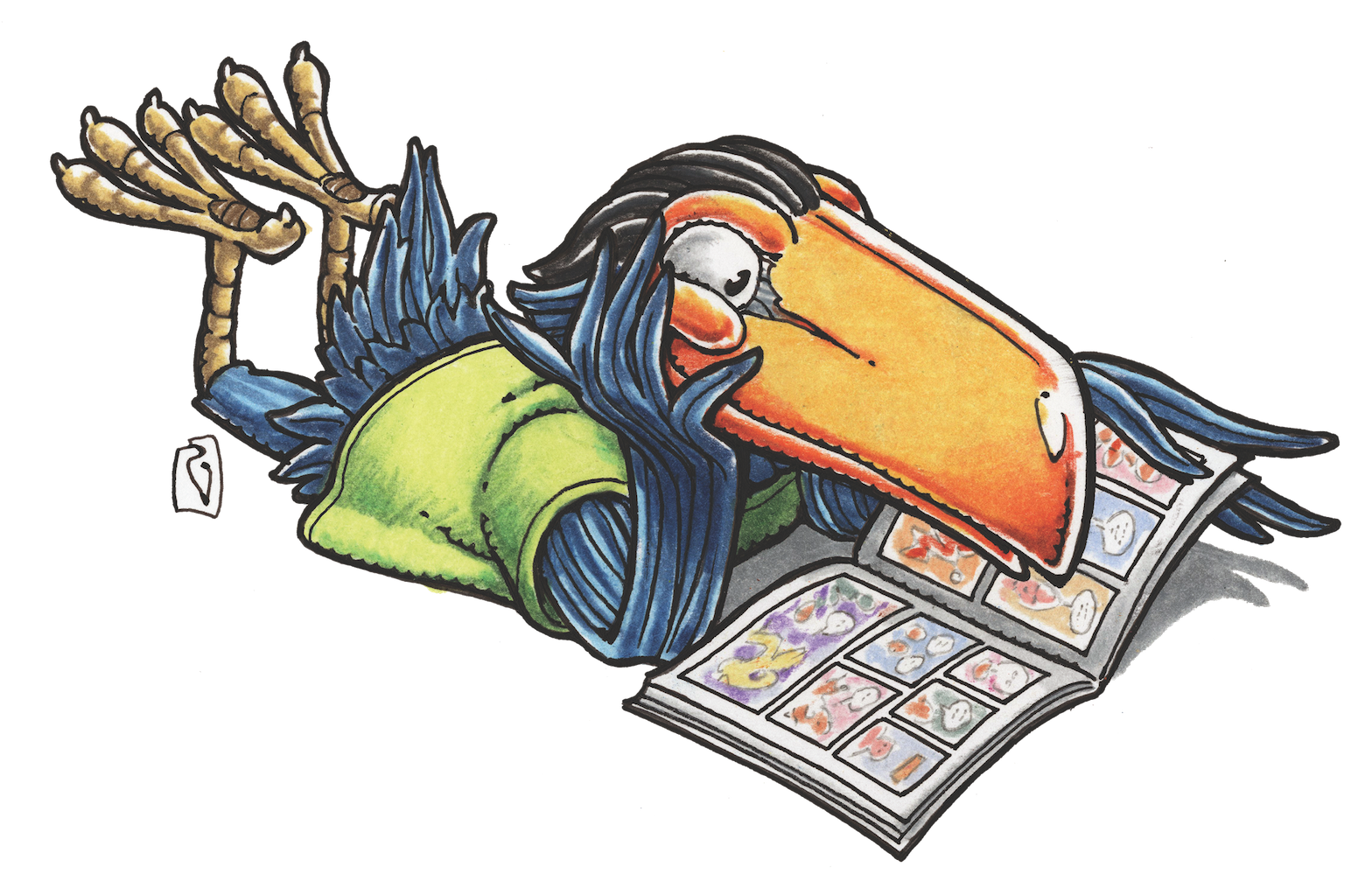
We’re back with Part 2 of our interview with WonderCon Anaheim special guest Kelly Sue Deconnick! (Click here to read Part 1.) In our last installment, we left you hanging as Ms. DeConnick revealed she is normally in bed by 8:00 PM each evening and we were talking to her past that hour, late in January. All is fine: Kelly Sue got back on her killer schedule of writing, blogging, parenting, and life with her husband, fellow comics writer Matt Fraction. In Part 2, we discuss Kelly Sue’s creator-owned work, including Pretty Deadly and the upcoming Bitch Planet, and how she urges everyone who wants to break into comics to concentrate on making comics first, then try to get work.
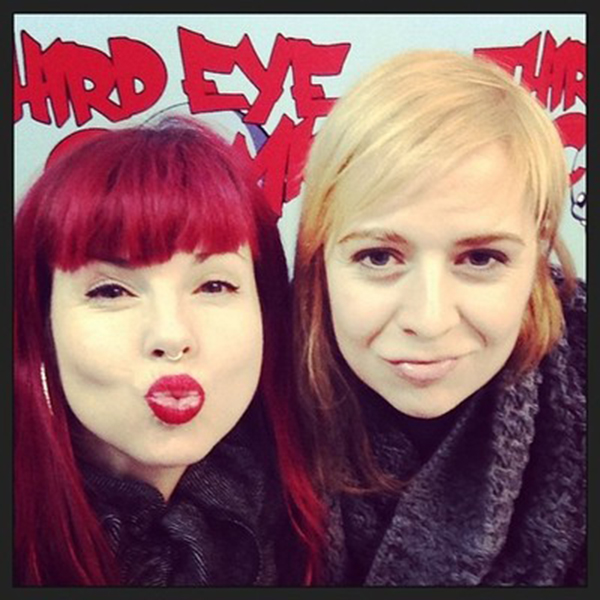
Duckface selfie photo by Kelly Sue DeConnick
Toucan: Let’s talk about your creator-owned books because it seems like you’re leaning towards that right now. Where did Pretty Deadly come from?
Kelly Sue: It started when Emma Rios and I worked together on Osborn: Evil Incarcerated. I so enjoyed partnering with her that I wanted to work with her again, and so I asked if she would be interested in working on something creator-owned and she said yes. I pitched her on a grifter story and she was like, nah . . . how about a western? Oddly enough [DC Comics editor] Joey Cavalieri had told me years before that artists hate westerns. You’ll never do a western because artists hate to draw horses So I told Emma and I was like, but I thought artists hated to draw horses and she looked at me like I was a crazy person and then I decided that maybe Joey had punked me. It turns out that a lot of artists actually really do hate to draw horses. I guess horses are hard to draw.
So we started developing this story. It started with this image Emma had of a woman sewing up her own side, and she kind of just drew that for me and then we started developing the character out of that. My first attempt at a plot for it was very straightforward, it’s wasn’t mythical. It was a very straightforward revenge western about this woman who was a sharpshooter in a Wild West show and the show was in the eastern part of the country. It was this idea about how the eastern part of the country had about what the west was. And as the show moves towards the west, where this woman was traveling to find the men who had been responsible for the death of her mother, she gains a following: this yellow journalist who wrote about her as she went to the west, and more and more people start following the show, literally following to the west. That was my original concept for it and the Deathface was a character in the Wild West show. She would be the first to ride into a town and had this black horse that would kind of rear up, and she would do her sharpshooting exhibition that would stun and amaze the crowd and then hand out flyers. And then at one point it was a contest and then Alice began as a woman who had half of her face burned and that was when the title came into play, that was when Pretty Deadly became part of it. We started musing on what those two ideas meant in opposition to one another—and together—and the idea of women in cages, and it just kind of developed like that.
Emma and I both thought six people were going to read this book. So we thought this is our shot at doing whatever we want for the five minutes that we’re going to be allowed to do it, so we’re doing whatever we want. I think that I was in particular reacting against—and I understand why—but in mainstream superhero comics, clarity is everything. You have to explain everything as you go or you get put through the ringer for it. There’s some writers that are allowed, some people get away with it. I am not of that stature. I do not get away with it. There was one particular point at which I was arguing with an editor about a caption. I wanted this caption to look like it was handwritten on paper and I didn’t want any explanation of why it appeared that way and then a few pages later it would be made very clear why it appeared that way. This editor and I went back and forth on it because it would be jarring to the reader and I was like, it’s going to be jarring to them for a few pages, they will be fine. They will recover. The reader can be uncomfortable for four pages and they’ll be fine. As a reader this is a thing I like. One of the things that I love about comics is I can flip back and forth and figure it out. I prefer to be engaged in that way, not always, and I don’t need it to be value judgment. If that is not your thing, that doesn’t mean I think I’m smarter than you or anything else that I’ve heard projected. It just means different people have different taste. This is how I like it. So I think in developing Pretty Deadly there was a certain adamant feeling against explaining anything. We are going to let this story unfold and you can put it together. It is a wildly uncommercial instinct to have, but we weren’t terrifically concerned about commercial appeal because we sort of thought with two relativity unknown women doing a western with a female lead, six people will buy this book.
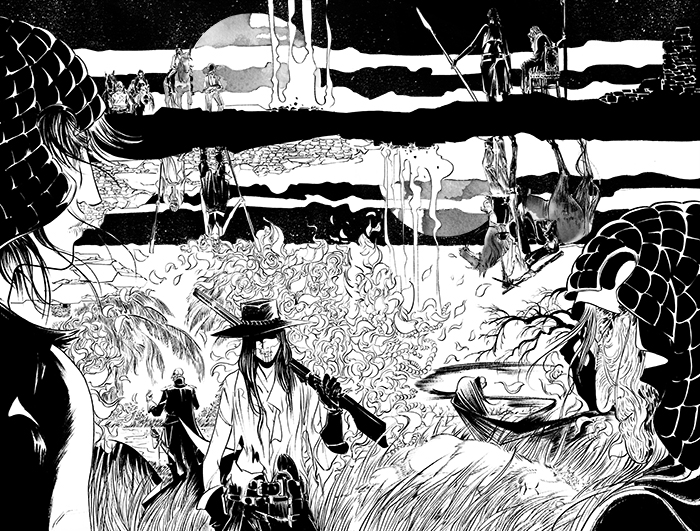
Toucan: Well, you were wrong weren’t you?
Kelly Sue: Yes, I was, I was. So the impulse was well, then let’s have a good time, let’s do it exactly the way we want to do it, and I think that—and Emma has a different take on this, Emma was like it’s our playground, we do what we want. I sort of admit to being affected by the fact that so many people have found it inscrutable. It’s hard for me because I don’t feel it’s that challenging a read, but we don’t tip our cards and we don’t show how the pieces start to fit together at all until the third issue. So that is very unusual, and I can absolutely understand why that’s not everyone’s cup of tea, but I do find myself affected by it and I’m trying to fight against that impulse. I think if you are writing to please anyone—except your editor or your own intuition—that you are risking making watery soup, but I confess going into Bitch Planet, there is a part of me that does feel like I need to prove that I am not deliberately obtuse and I’m not at all certain how I feel about that.
Toucan: Do you feel that maybe this would work better in collected form than as individual issues?
Kelly Sue: It would be, yes, yes. I think if you are someone who doesn’t like that particular kind of discomfort in your reading, that kind of “I don’t know what’s going on here.” I tend to enjoy that. I know that was my experience of reading Casanova for quite a while. I don’t get how these pieces fit together, but I’m enjoying the story, I love the characters and …
Toucan: And you could always ask the guy who wrote it. [Matt Fraction, Kelly Sue’s husband, writes Casanova.]
Kelly Sue: I could do that, but it seems like cheating. We talked about the big twist for the second arc so I knew that one before we went in, because we were having dinner one night and I was like as long as you’re not going to pay attention to me, do you want to talk about what you’re thinking about? So we talked that one through.
Toucan: Let’s talk a little bit about Bitch Planet, which you just introduced at the Image Expo. It’s another creator-owned ongoing series or is it a miniseries?
Kelly Sue: It’s an ongoing, but in the same fashion as Pretty Deadly is an ongoing. We’re sort of taking that Criminal model, where we’re going to do an arc, take time off to get caught up again, do an arc, take time off to get caught up again, and so on, because I think it’s abundantly clear with Pretty Deadly why. If you look at the art, that is not a book that can be produced in 30 days or sometimes less than 30 days. It’s just not possible. I think Bitch Planet is going to be just as lovely, but in a very different kind of way. They’re not quite as many marks on the page, but Valentine De Landro and I have talked and Val is not a particularly speedy artist either and I am not a particular speedy writer, so I expect that we’re going to have to do our arcs in this structure in order to maintain anything that is anything like monthly.
This is the thing from the business end that I’m sort of trying to figure out. I’ve started getting panicked emails from people wanting to know why the next Pretty Deadly is not solicited and I don’t know what the best avenue is to get the word out that it’s like oh no, no, no, this was planned. If you read any interview with me from the beginning of this book, I talked about how this would be the structure. It is an ongoing where we will take breaks between arcs because it is simply not possible for this book to come out monthly with no breaks. We would have to shift the creative team and then it wouldn’t be the same book.
Toucan: Obviously Pretty Deadly evolved with a lot of back and forth between you and Emma Rios. What makes a great collaboration for you?
Kelly Sue: I think they’re all very different. Having yet to have what I would call a bad collaborative experience, I’ve had some that were less satisfying, some where I just didn’t really have very much interaction with the artist or the artist got switched, so I wrote the script for one person and someone else ended up drawing it, which is a bit of a bummer. Because I really do feel that it’s a collaborative artform, and if you are not writing your script for that artist, you’re doing it wrong. I don’t think that there is a default, middle-of-the-road way to write a script. I tend to think of them as a letter to the artist, and I need to know who I’m writing this letter to, but the reality of the industry is that you don’t always get to know that and that’s a bit of a bummer for me. I have a theater background and I was an improviser for a long time, so [I prefer to work with] someone who is “Yes!” and we have to have the same taste, we have to like the same things. There’s a part of it that’s just intuitive, where you’re just trying to decide what feels right and you have to either agree on that or have a deep sense of trust in the other person’s instinct. Emma is really just my ideal collaborator. I love her to death. Everything that comes from her pen is beautiful and she’s an amazing storyteller. That is the ideal relationship to me and it’s well established. We’ve been working together for a long time now. Val and I don’t know each other quite as well, but it was an intuitive, kind of instinctive choice that I wanted to work with him. I was at a convention a few years ago and I was walking around Artists’ Alley. Nowadays at a comic book convention with the red hair and everything, it’s likely that if I’m walking around that I’m recognized and I’m treated as a comics professional. But for a long time you could see peoples’ eyes sort of look through me, looking for the wallet that would be behind me and Val didn’t do that. Val stood up and shook my hand and showed me his portfolio and just made the base assumption that I might be someone that he could work with. It sounds so simple, but it was a revelation to me. I looked at his portfolio and I loved his work. So we exchanged cards and a few emails and I tried to get him put on a couple of different projects with me, but the timing never worked out. I think at some point he was like, we don’t have to wait for Marvel or DC to give us a slot to do this, we could just do something on our own. So I had a running list of story ideas that I maintained and I sent them to him and said pick one, and he wrote back and said, “I like this one and I like this one, but I got to say I love Bitch Planet.” I was like, all right . . . Bitch Planet it is!
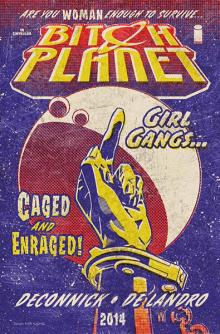
Toucan: So tell us the pitch for Bitch Planet.
Kelly Sue: The pitch is that it is an all-female penal colony in space and five women see an opportunity for escape in a kind of gladiatorial combat with a men’s team. That is the short pitch.
Toucan: And that will be out in June, is that correct?
Kelly Sue: We haven’t set a date for it yet. I’m hoping to get him the first script at the end of February and then we’ll want to have a few in the can before we solicit it, so I expect it will be the end of summer, beginning of fall before that’s out.
Toucan: How do you feel about the whole creator-owned thing?
Kelly Sue: You know, so far so good. There’s so much to manage by yourself. I have editors on both of my creator-owned books, but it’s interesting because I came up through manga and co-writing. Most people I know had creator-owned books before they had company books, so they’ve done all of this. They’ve had to hire a letterer. That was the thing for me on Pretty Deadly. We were working with Dustin Harbin at first, but then the schedule didn’t work out. So it was very amicable and Dustin pointed us towards Clayton Cowles, who I had worked with on Avengers Assemble and who was a very good friend of Jordie Bellaire, who was our colorist, so it was like great, done. But I had never chosen a font; in any other book I’d ever worked on that was out of my hands.
Toucan: And with a company like Marvel you’re dealing with more of a house style than what fits the book.
Kelly Sue: Right, and I understood. I’d liked Clayton’s work for quite a while. I remembered I had taken a screen shot of something that he had done in Avengers Assemble where he’d put in a space, a simple space between balloons that helped sell the timing of the joke. It was such a little thing and it was so perfect. It was like that’s what a good letterer does; they quietly give the speech a rhythm. And so I was already an admirer. But I didn’t have the language to have that conversation. When he showed me a couple fonts and I was like, I don’t like them, I couldn’t tell him why. All I could say was I feel like the fonts are bringing a tone that in some cases work with the scene, but in some cases they work against the tone of the scene, so it was very difficult. It was like I don’t have the language to then say I’m looking for something that’s more like blah. Consequently, we didn’t find the font that I love until the third issue, so now we’re going to have to have issues one and two relettered. And there’s no bad guy in this, nobody did anything wrong—it’s just this is a learning experience. I’ve since talked to Chris Eliopoulos and Richard Starkings, who are two of the leading letterers in the industry and they’ve both been very kind to me, sort of helping me. Starkings even gave me a copy of his book to help learn how to think about lettering and talk about lettering.
That’s just one example of the sort of thing that when you’re doing creator-owned work, particularly at Image, where it is really very creator-owned, you are making all of the choices from the top down. It’s liberating and there’s going to be some stuff you’re going to have to learn.
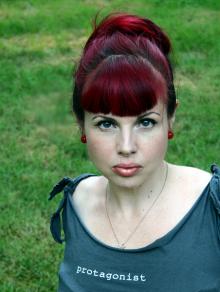
Toucan: What’s it like living with another comic book writer?
Kelly Sue: It’s pretty great. I recommend it. I picked a good one so that’s worked out for me.
Toucan: Awhile back on Tumblr, Brian Michael Bendis was asked a question about whether or not there was such a job in comics as an idea person, and he answered something like yes, there is, but it belongs to Henry Fraction and he’s better at it than you will ever be. Is your son Henry the brains behind the DeConnick/Fraction books?
Kelly Sue: He might be! The issue of Pretty Deadly that comes out tomorrow begins with a hummingbird and that comes directly from a conversation that I had with Henry that’s detailed at the end of issue two. That’s a hummingbird from his dreams. The Black Hulk that was in Matt’s Defenders series, that was Henry. What else has Henry come up with? Henry’s come up with quite a few things. Henry gave Brian an X-Men character. Yeah, he is that guy. He’s got a million of them, so don’t you worry about it. There was one show where it was Matt and I at one table and the table next to us were [Captain Marvel editor] Sana Amanat and C. B. Cebulski from Marvel doing portfolio reviews, and whenever they were there and they did not have a line, Henry was there drawing on the table and pitching them characters and he’s 6.
Toucan: He’s going to support you in your old age.
Kelly Sue: Yes, that’s a good idea, and my spin on that is I think he’s going to do stories about his sister, who is either going to be a superhero or a supervillain, I’m not sure which yet.
Toucan: Whose work do you currently read and enjoy?
Kelly Sue: Kind of everyone that you would expect. I’m the hugest fan of Matt’s work. Sex Criminals is mindboggling to me. I think Matt thinks critically about comics and sort of tries to do things with comics very actively in a way I don’t think I have the courage to do yet. I think I need to nail the delivery on the simple stuff before I could start breaking the fourth wall as successfully as he does. Then there is just genuine magic in the collaboration between him and [artist] David Aja on Hawkeye, and with [colorist] Matt Hollingsworth. People at Marvel get very uncomfortable if I try to tell anything out of order; Matt plays with time in that book—he does it frequently in a lot of books—but he plays with time in that book in such a way that you should be completely lost, but he does it so artfully and Hollingsworth in particular uses color so well that you never lose your footing. You’re never lost in the story. You can hop around the calendar and still completely know where you are and that is amazing to me.
I think Satellite Sam is Matt tricking Howard Chaykin into telling him stories. In fact we got a package from Chaykin today. I’m like what is that, he’s like it’s a book he wants me to read. I’m like, ah, you lucky dog. Sex Criminals, the Queen song scene, the musical number with the Post-It Notes, I love that so much I don’t want the Post-It Notes removed. I prefer it with the Post-It Notes. I think there’s something so delightful about the self-consciousness of that. I’m a big fan of Bendis. My husband’s first gift to me was a set of index cards. His second gift to me was the Powers: Script Book. I love Jon Hickman because he’s almost my opposite. He’s very good at things I am very bad at. He tells very, very big stories and he’s so good at plot. Ed Brubaker never ceases to surprise me. I always think that I’m like oh, okay, I know what to expect from Ed and he always levels up.
I just looked behind me at what’s on my stack right now. I just started reading Taiyo Matsumoto, who is one of my all-time favorite creators. I’ve never had the pleasure of meeting Matsumoto, who is a goddamn genius, but I just started reading Sunny the other day.
Toucan: You recently referred to yourself as the Smurfette on the Avengers panel at a convention and you used that point as a call to action for women who want to work in comics to get going on it. What advice would you give for any woman—or man—who wants to break into comics?
Kelly Sue: Make comics. I think a mistake that people make is they think they need to work on getting hired. Don’t work on getting hired, make comics. Making comics will get you hired. There’s that Devin Grayson quote about breaking into comics is like breaking into Fort Knox. Once they find out how you did it they make sure no one can get in that way again.
The way I came up was through a message board. I told you I have like three or four different breaking into comic stories because my first paid job in comics [was writing reviews], and I then I have my first work writing the English adaptations of Japanese and Korean comics, and then I have my first co-writing gig, and then I have my first “big two” job, and then I have my first creator-owned book. And for all of those I had to break in sort of differently. The Internet is a wildly different place than it was at the time when I was coming up, and trying to copy that career trajectory is not going to work for you.
When I got the gig with Steve Niles co-writing 30 Days of Night: Eben & Stella, Steve was familiar with my writing because we’d sent stories and things back and forth to one another because we knew each other from message boards. I hadn’t been writing comics, but I had been writing professionally. By the time I stopped doing English adaptations—and you could argue that I haven’t stopped because of Barbarella, but previous to Barbarella—when I stopped doing English adaptations, I had written something like 11,000 pages of comic adaptations. So you have to work first. I had a woman write to me not too long ago who said, “I really feel like I have a voice and I have something to contribute,” and I absolutely agree and I would like to help her however I can, but when I asked her about what comic writing experience she’d had, she had written half a script. Well, that’s not going to do it. Whenever I’m doing a signing, I always offer to do a workshop as well, and I have met people at workshops who have come up and given me comics that they’ve done and sometimes they found another artist who was learning and sometimes they’ve done their own art, either like Fumetti-style photo comics or whatever. All of that works. The most important thing is that you are writing.
I can give people exercises to do to get their pencils moving. Start reverse-engineering the comics that you love. Write the same script for three different artists. If you’re not writing for an artist that’s actually going to be working on it, pick three different artists. Write it for Alex Maleev, write it for David Finch, and write it for Chip Zdarsky. There’s a ton of things that you can do. Don’t work on getting hired. Learn your craft, that’s first and foremost. Then get involved in communities of people, like this very active Tumblr community; these people are forming friendships that remind me of the friendships that we formed on the WEF. Those people {from the Warren Ellis Forum] are now my colleagues. Those people are people we came up with, and we came together because of a love of comics and we started making comics together. I got all of my work because of those people. So I think those things go hand in hand, but people will tend to focus on “I have this idea and I want to pitch it to Marvel.” Well, that’s not going to happen, sweetheart, and that’s not a gendered sweetheart, that’s all the sweethearts.
I think my primary advice is start now. Do not wait. After that, when it comes to the gendered part of the experience, if you want to make comics there is nothing that should stop you. There is this perception that superhero comics are a boys’ game and dying a slow death, but it’s dying. I think we need voices. We need a chorus of diverse voices. What I tell the women at my workshops is I want to help you, but the thing that you need to do is get ready. I had an opportunity the other day. Someone had a character they thought that they would like to write, it was a good opportunity to bring in a new writer, and I had an opportunity to recommend someone. It happens. It happens frequently. So get ready so that I can recommend you.
Toucan: What do you take away from going to conventions like WonderCon Anaheim and meeting your fans?
Kelly Sue: Oh, I am in my element. It’s funny because I am a straight-up extravert.
Toucan: I couldn’t tell from this interview.
Kelly Sue: No? (laughter) I absolutely love to talk to people. There is nothing I enjoy more, and so cons go very quickly for me. It doesn’t drag out at all. It feels like I blinked and it’s over. I get to meet all of these wonderful people and I always leave feeling energized. So it is a fantastic experience for me. The only thing I would change about a con is I don’t get any work done while I’m there.
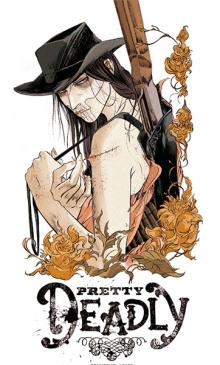
Toucan: If you could say one thing to a person who doesn’t read comics to get them to read comics, what would it be?
Kelly Sue: Lighten up. Yeah. I would sort of assume—I’m projecting a little bit—but I’m assuming that somebody who doesn’t read comics has made some value judgment about comics. That’s not necessarily true; it may just be that we have this assumption that because the predominant genre in the United States in comics is superhero comics and a lot of people left superhero comics when they were children and assume that comics are for kids. I think not liking comics is sort of like not liking movies. There is a comic that you like, there is a movie that you like, we just have to find the right one for you. One of the things I get nuts over is when female readers are treated like a monolith of like, oh, you have a woman in your store, you should give her Fables, women love Fables. Some women love Fables, some women love Punisher, some women love Witchblade. We don’t all think the same. Can you imagine a guy coming into a comic book store and you’re like,”Oh, you’re a guy, let me get you Batman. Guys like Batman.” Well, not necessarily. Comics are pretty diverse.
Toucan: What excites you about working in comics today?
Kelly Sue: I love the same things about it that I loved when I was a kid. I love that it’s disposable. I think that, for all of my screaming, yelling, and bravado, I am subject to as much fear as anybody else and I find it crippling. And the kind of things that we talked about before, I kind of have to trick myself into doing things, and so there’s a beautiful disposableness to comics. You just do the best you can. Matt even has a Post-It Note on his computer that says “I’ll just have to do better next time,” and it’s from Ed Wood. With serial comics that come out every 30 days, there’s a point at which you just have to call it done. I turned in a script today and I don’t like it. First one in a long time I’ve felt that way about. It’s a first draft and we’re not up against the wall or anything, I’ll be able to get notes on it and do a good revision, but I usually feel better about a first draft than I did about this one, but it was due. I reworked it as much as I had time to rework it and then I had to turn it in. Because of that time clock my editor will have a look at it and I’ve actually gotten an email from him already saying that he read it and he thinks that I’m exaggerating the problems and the structure just needs to be simplified a bit and we’ll talk about it tomorrow. If it was up to me, if comics weren’t books that had to come out every 30 days, I would fiddle with that thing forever rather than showing it to someone else who might be able to say “Oh, no you just need to tweak this.” So I love the beautiful disposableness to it.
I love working on the Capitan Marvel book. I loved the lizard brain stuff. I love the community that’s risen up around that book. With Pretty Deadly it’s all about the collaboration. It all feels so magical to me. Pretty Deadly doesn’t feel like I’m writing it so much as it feels like I’m discovering it. I still get surprised by the story when pieces fit together in ways I hadn’t expected. I’m like oh, oh wait: we had a structure but it’s so much more intense than what we imagined. I’m a very lucky human being that I get to do this for a living. I’m a very tired human being that I get to do this for a living, but I think it’s worth it.
Kelly Sue DeConnick is a special guest at WonderCon Anaheim, April 18-20 at the Anaheim Convention Center. Click here for more info on how you can attend one of the country’s best comics and pop culture events!